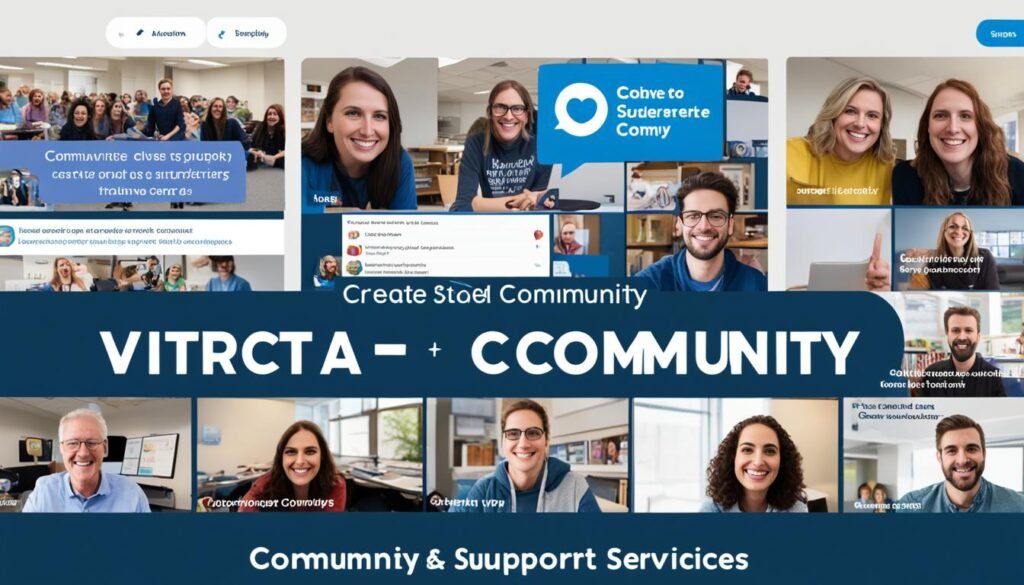Deciding whether to work while pursuing a Masters degree can be a challenging decision. On one hand, the prospect of gaining valuable work experience and financing your studies may seem appealing. On the other hand, the thought of balancing work and studies can be daunting. In this article, we will explore the considerations and tips for successfully managing work while pursuing a Masters degree.
Key Takeaways:
- Working while pursuing a Masters degree can enhance your experience and finance your studies.
- Consider factors such as the flexibility of your lifestyle and the requirements of your chosen Masters program before applying.
- Creating a schedule, connecting with fellow students, tracking your progress, and prioritizing self-care are essential for balancing work and studies.
- Online and hybrid Masters degree programs offer flexibility for working professionals.
- With careful planning and effective time management, you can find the right balance between work and studies.
Benefits of working while pursuing a Masters degree
Working while pursuing a Masters degree can offer a range of benefits that will enhance your academic and professional journey. The opportunity to balance work and studies provides you with:
- Increased Earning Potential: By working while studying, you can earn an income and support yourself financially. This not only helps cover educational expenses but also allows you to gain valuable experience in your field, increasing your earning potential in the long run.
- Expanded Job Opportunities: Employers often value candidates with real-world experience. By working while pursuing your Masters, you can gain practical skills and demonstrate your ability to handle work responsibilities alongside your academic commitments. This makes you a competitive candidate for job opportunities upon graduation.
- Enhanced Skillset: Combining work and studies allows you to apply the knowledge gained in the classroom to real-life situations. This practical experience deepens your understanding and sharpens your skills, making you a more versatile and capable professional in your chosen field.
This powerful combination of academic knowledge and work experience positions you for success, opening doors to various career paths. The unique insights gained from both realms empower you to make informed decisions and contribute meaningfully to your industry.
Factors to consider before applying to a Masters program
Before embarking on your journey towards a Masters degree, it is crucial to carefully consider various factors that can impact your ability to successfully balance work and studies. By evaluating the flexibility of your lifestyle, the type of degree program you wish to pursue, and the educational opportunities available, you can make an informed decision and set yourself up for success.
Flexibility of Lifestyle
Assessing the flexibility of your current lifestyle is essential in determining the feasibility of working while pursuing a Masters degree. Consider your family responsibilities, work commitments, and personal obligations. Will you have the flexibility to allocate sufficient time for both work and studies? Are you able to delegate or remove certain responsibilities to create more time for your graduate studies? Additionally, evaluate if you will still be able to support yourself and your family financially while working and studying.
Type of Degree Program
The specific requirements of the Masters degree program you wish to pursue will also impact your ability to work while studying. Some programs may have more demanding schedules, requiring a larger time commitment for attending classes, studying for exams, or completing internships. Consider the nature of the program and how it aligns with your work schedule and availability.
Educational Opportunities
When selecting a Masters program, explore the different educational opportunities available to you. Investigate online programs, in-person programs, and hybrid programs to find the format that best suits your needs and allows for flexibility. Online programs, for example, often provide the ability to study at your own pace and offer more flexible scheduling options. Research various programs and carefully weigh the pros and cons of each to find the best fit for your work-life balance.
By taking these factors into consideration before applying to a Masters program, you can determine if your lifestyle, specific degree program requirements, and available educational opportunities align with your goal of successfully balancing work and studies.

Flexibility of lifestyle
Assessing the flexibility of your current lifestyle is a crucial step in determining whether you can successfully balance work and graduate studies. Consider the various responsibilities you have, including family responsibilities, work responsibilities, and personal responsibilities.
Take a moment to evaluate whether you can delegate certain tasks or create more efficient systems to make room for your graduate studies. By finding ways to prioritize and manage your responsibilities effectively, you can create the necessary time and space for your studies.
It’s also important to consider how pursuing a Masters degree will impact your ability to support yourself and your family financially. Explore whether your current work arrangements provide you with the financial stability needed to embark on this academic journey. If necessary, explore alternative options or financial aids that can help alleviate any concerns.
Remember, finding the right balance between work, family, and personal commitments is essential for your overall well-being and academic success. Prioritizing self-care and having open and honest conversations with your loved ones about your goals and expectations can help ensure a harmonious integration of your graduate studies into your daily life.
Considerations for Assessing Flexibility:
- Identify tasks that can be delegated or eliminated
- Discuss your academic goals with your family and seek their support
- Explore financial aid options if needed
- Create a schedule that accommodates your family, work, and personal commitments
- Seek guidance and support from your employer
The Masters program demands and requirements
When considering whether you can work full-time while studying for a Masters degree, it’s crucial to carefully evaluate the demands and requirements of your chosen program. The time commitment for attending classes, studying for exams, and completing assignments can vary depending on the academic requirements set by your university.
One aspect to consider is the rigor and intensity of the course. Some Masters programs may have a more demanding workload, requiring you to dedicate a significant amount of time to studying and completing assignments. Time management skills are essential in order to balance your work and academic responsibilities effectively.
In addition to coursework, many Masters programs have other requirements such as internships or clinical experiences that provide practical training in your field of study. These additional commitments can further impact your ability to work full-time while pursuing your degree.
It’s important to research and understand the unique demands and requirements of the Masters program you are interested in, including any exams or assessments you may need to prepare for. By having a clear picture of what is expected from you academically, you can better assess whether working full-time alongside your studies is feasible.
Remember, finding the right balance between work and the demands of your Masters program is essential for your academic success. It may require effective time management, prioritization, and the willingness to make necessary adjustments to your work schedule.
Image:
Having a clear understanding of the demands and requirements of your Masters program is crucial in determining whether working full-time is realistic while pursuing your degree.
Degree program formats available
The format of your Masters degree program can greatly impact your ability to work while studying. Whether you choose online programs, in-person programs, or hybrid programs, each option offers unique advantages and considerations.
Online Programs
Online programs provide the flexibility to study at your own pace and from the comfort of your own home. This format allows you to balance work and studies more easily, as you can access course materials and lectures at any time. Online programs are ideal for individuals who require a flexible schedule and prefer independent learning.
In-Person Programs
In-person Masters programs involve attending classes on campus. This format offers face-to-face interactions with professors and fellow students, allowing for vibrant discussions and networking opportunities. In-person programs are suitable for those who thrive in a structured learning environment and prefer the benefits of immediate feedback and in-person collaboration.
Hybrid Programs
Hybrid programs combine elements of online and in-person learning. Students in hybrid programs typically attend some classes on campus while completing other coursework online. This format offers the opportunity for in-person engagement and networking while still providing the flexibility of online learning. Hybrid programs are a great choice for individuals who desire a balance between face-to-face interactions and independent study.
When choosing a Masters program, carefully consider your personal preferences, learning style, and lifestyle commitments. The program format you select will impact your ability to manage work and studies effectively. Whether you opt for online, in-person, or hybrid programs, each offers its own set of advantages and considerations. Choose the format that aligns best with your needs and goals.
Tips for earning a Masters degree while working full-time
Successfully managing work and studies requires effective strategies. It can be challenging to balance the demands of a full-time job and a Masters degree program, but with careful planning and organization, it is possible to excel in both areas. Here are some key tips to help you navigate this balancing act:
Create a Schedule
One of the most important strategies for managing work and studies is to create a schedule that allows you to allocate time for both. Determine your most productive hours and designate specific time slots for studying. Be realistic about your work commitments and set aside dedicated study days or intervals for deep learning. Ensure that you include study breaks to avoid burnout and maintain focus throughout the day.
Connect with Other Students
Building a network of fellow students who are also working while pursuing their Masters degrees can provide invaluable support and motivation. Join online groups or forums where you can connect with other students facing similar challenges. Share experiences, study tips, and resources to enhance your learning journey. Additionally, don’t hesitate to reach out to your school’s student support services for guidance and advice.
Track Your Progress
Setting goals and tracking your progress is essential for staying motivated and focused. Break down your coursework and assignments into smaller, manageable tasks, and celebrate each milestone you achieve. Regularly assess your progress to ensure that you stay on track with completing assignments and meeting deadlines.

Make Time for Yourself
It’s crucial to prioritize self-care and make time for yourself amidst the demands of work and studies. Incorporate activities that help you relax and recharge. Engage in hobbies or physical exercise that you enjoy, practice mindfulness or meditation, and spend quality time with friends and family. Taking care of your well-being will enhance your ability to manage both work and studies effectively.
By implementing these strategies, you can create a healthy balance between work and earning your Masters degree. Remember, it is essential to be proactive, self-disciplined, and resilient throughout this journey. With the right approach, you can thrive academically and professionally while working full-time.
Create a schedule
Managing your time effectively is crucial when working and studying simultaneously. Establishing a schedule for studying can help you stay organized and ensure that you make progress towards your academic goals. Here are some tips to help you create a schedule that works for you:
- Utilize your breaks: Take advantage of your lunch breaks and other short interruptions throughout the day to squeeze in some study time. Use this focused period to review notes, read assigned materials, or work on smaller tasks.
- Make use of your commutes: If you have a daily commute, consider using that time productively. Listen to educational podcasts, audiobooks, or recorded lectures related to your field of study. This will allow you to make the most of your travel time and maximize your learning opportunities.
- Dedicate after-work hours: After a long day at work, it can be tempting to relax and unwind. However, setting aside designated study hours in the evening can help you maintain momentum and ensure that you are consistently making progress. Find a quiet space where you can focus and dedicate this time solely to your studies.
- Allocate designated study days: It may be necessary to assign specific days of the week as designated study days. These days are solely dedicated to completing assignments, reviewing coursework, and preparing for exams. Even if your classmates have different study schedules, find what works best for you and stick to it. Consistency is key.
By following a well-structured schedule, you can effectively manage your time and strike a healthy balance between work and studies.
Connect with other students
Working and studying full-time can be isolating, but you don’t have to navigate this journey alone. There are resources available to connect with other students who are also managing the demands of work and a Masters program. By joining online groups and taking advantage of your school’s student support services, you can find guidance, support, and a sense of community.
Online groups provide a platform for you to connect with fellow students who understand the challenges you’re facing. These groups allow you to share experiences, seek advice, and build relationships with others who are on a similar academic and professional path. Whether it’s a dedicated online forum or a social media group, you’ll find a supportive network that can offer valuable insights and encouragement.
Additionally, your school’s student support services are there to ensure you have the resources necessary to thrive academically and personally. These services may include academic advisors, career counselors, mental health support, and more. They can guide you through the various aspects of your Masters program, offer study tips, assist with course selection, and provide strategies for managing your time effectively.

Benefits of connecting with other students
- You can exchange ideas, insights, and tips on managing the workload of work and studies.
- Networking opportunities to build professional connections within your field.
- Access to shared resources, study materials, and recommended readings.
- Motivation and inspiration from seeing others successfully navigate similar challenges.
- Opportunities for study groups and collaborative learning.
While working and studying full-time can be demanding, remember that you are not alone in this journey. Take advantage of the online groups and student support services available to you. Connecting with other students will not only provide you with a network of support but also enhance your overall experience as you pursue your Masters degree.
Track your progress
Setting goals and tracking your progress is essential for maintaining motivation throughout your Masters program. By establishing clear objectives, you give yourself something to strive for and a sense of purpose. Whether it’s completing a challenging assignment, mastering a new concept, or achieving a certain grade, each milestone brings you closer to your ultimate goal: completing your degree.
Celebrate your smaller goals along the way to keep yourself motivated. Treat yourself to a special reward or acknowledge your achievements with a moment of self-appreciation. By recognizing and celebrating your efforts, you reinforce your motivation and dedication to your studies.
Remember that every accomplishment, no matter how small, contributes to your overall success in completing your degree. Each step forward is a step closer to achieving your dreams and unlocking new opportunities in your professional journey.
Find ways to visually track your progress, such as using a checklist or progress chart. Seeing your achievements displayed tangibly can be incredibly motivating and make you proud of how far you have come. It also helps you stay on track and maintain focus, even during challenging times.
Stay motivated by regularly reviewing and updating your goals. As you progress through your Masters program, your aspirations may evolve, and new opportunities may arise. Stay flexible and adjust your goals accordingly to ensure they remain relevant and achievable.
Remember, staying motivated is an ongoing process. There will be ups and downs, but staying focused on your goals and celebrating your achievements along the way will help you persevere and successfully complete your Masters program.
Make time for yourself
Avoiding burnout is crucial when balancing work and studies. In the midst of managing your professional responsibilities and academic commitments, it’s important to prioritize self-care and relaxation. Taking care of yourself not only contributes to your overall well-being but also enhances your success in both work and studies.
One effective way to make time for yourself is by finding activities and hobbies that you enjoy. Engaging in activities that bring you pleasure and provide an outlet for stress can have a positive impact on your mental and emotional well-being. Whether it’s reading a book, going for a walk, practicing a hobby, or enjoying a favorite sport, carving out time for these activities will help you recharge and rejuvenate.
Another essential aspect of self-care is ensuring you take breaks and allow yourself to relax. Continuous work without breaks can lead to burnout and decreased productivity. Use your breaks to step away from your work and engage in activities that help you unwind and destress. This could include practicing deep breathing exercises, meditating, or listening to music.

Remember to prioritize self-care in your schedule. Set aside dedicated time for yourself each day or week, ensuring it aligns with your personal preferences and needs. By incorporating self-care into your routine, you are investing in your physical, mental, and emotional well-being, ultimately enhancing your ability to manage the demands of both work and studies.
By making time for yourself and prioritizing self-care, you’ll be better equipped to avoid burnout and maintain a healthy work-study balance. Remember that taking care of yourself is not a luxury but a necessity for long-term success and well-being.
Flexible Masters degree programs
When you’re working full-time, choosing a Masters program that offers flexibility is crucial. Fortunately, there are various options available that cater to the needs of working professionals like you.
Online programs are a popular choice for those seeking flexibility. With online Masters programs, you have the freedom to study at your own pace and complete coursework from the comfort of your home or office. This format allows you to balance your work responsibilities while pursuing your degree.
Hybrid programs provide another flexible option. These programs combine traditional in-person classes with online coursework, offering a balance between face-to-face interaction with professors and classmates and the convenience of online learning. Hybrid programs allow you to customize your schedule and attend classes on campus or complete assignments remotely.
Flexible scheduling is a key feature to look for in a Masters program. Programs that offer evening or weekend classes, as well as the option to take courses part-time, provide the flexibility you need to accommodate your work commitments. By choosing a program with flexible scheduling, you can better manage your time and create a study routine that works for you.
Whether you opt for an online program, a hybrid program, or a program with flexible scheduling options, these flexible Masters degree programs are designed to fit into your busy life, allowing you to pursue both your career and your education without compromising either.
Consider the flexibility of your Masters program as an investment in your future. It enables you to gain advanced knowledge and skills while maintaining your professional growth. With flexible Masters degree programs, you have the opportunity to take control of your education and achieve your academic and career goals.
Conclusion
Working while pursuing a Masters degree is not only possible but also a rewarding endeavor. By carefully planning and effectively managing your time, you can find the right balance between work and studies, enabling you to achieve your academic and professional goals.
Throughout this article, we have explored the benefits of working while pursuing a Masters degree, the factors to consider before applying to a Masters program, and the tips for successfully managing work and studies. It is clear that with the right mindset and strategies, you can excel in both areas of your life.
Remember, finding the right balance is key. Take into account the flexibility of your lifestyle, the demands and requirements of your chosen Masters program, and the available degree program formats. Additionally, create a schedule, connect with other students, track your progress, and make time for self-care.
By integrating these strategies, you can embark on a fulfilling journey of working and studying, paving the way for personal growth, increased earning potential, and expanded job opportunities. So, seize the opportunity, make informed decisions, and make the most out of your Masters program while maintaining a well-rounded life.
FAQ
Q: Should you work while in a Masters program?
A: Yes, working while pursuing a Masters degree can have numerous benefits, including increased earning potential and more job opportunities. It allows you to gain practical experience, enhance your skills, and make valuable connections in your chosen field.
Q: What factors should I consider before applying to a Masters program?
A: It’s essential to consider the flexibility of your lifestyle, the specific requirements of the degree you want to pursue, and the availability of different educational programs. Evaluating these factors will help you determine if you can effectively manage work and studies.
Q: How should I assess the flexibility of my lifestyle?
A: Consider whether you can delegate or remove tasks to make room for your graduate studies. Evaluate if you will still be able to support yourself and your family while working and studying.
Q: What are the demands and requirements of a Masters program?
A: The demands of a Masters program include attending classes, studying for exams, and possibly completing internships or clinical experience. It’s important to consider the time required for these activities when determining if you can work full-time while studying.
Q: What formats are available for Masters degree programs?
A: Masters degree programs can be online, in-person, or hybrid. Online programs offer flexibility and the ability to study at your own pace, while in-person or hybrid programs may require more structured schedules.
Q: What tips are there for balancing work and a Masters program?
A: Tips for successfully managing work and studies include creating a schedule, connecting with fellow students, tracking progress, and making time for yourself.
Q: How can I create a schedule when working and studying full-time?
A: Designate specific days for studying, even if they differ from your classmates’. Consider studying during lunch breaks, daily commutes, or after work hours. This will help you manage your time effectively and ensure you complete assignments on time.
Q: How can I connect with other students while working and studying?
A: Join online groups or reach out to your school’s student support services for guidance and support. Connecting with fellow students can help alleviate feelings of isolation and provide a support network.
Q: How can I track my progress while pursuing a Masters degree?
A: Setting goals and tracking your progress is important for staying motivated. Celebrate your smaller goals to keep yourself motivated, and recognize how each accomplishment contributes to your overall success in completing your degree.
Q: How can I avoid burnout while balancing work and studies?
A: It’s crucial to find time in your schedule for activities and hobbies you enjoy, prioritize self-care, and take breaks to relax. Taking care of yourself will contribute to your overall success in both work and studies.
Q: What types of Masters degree programs offer flexibility for working professionals?
A: Online and hybrid programs are often more flexible and cater to working professionals. These programs provide the freedom to study at your own pace and offer flexible scheduling options.
Q: Is it possible to work while pursuing a Masters degree?
A: Yes, it is possible to work while pursuing a Masters degree with careful planning and effective time management. By considering the factors discussed in this article and following the tips provided, you can find the right balance between work and studies and achieve your academic and professional goals.
Source Links
- https://academia.stackexchange.com/questions/142827/is-it-possible-to-complete-a-masters-degree-while-working-full-time
- https://www.goodwin.edu/enews/can-i-get-a-masters-degree-and-work-full-time/
- https://www.reddit.com/r/GradSchool/comments/12cll89/where_did_you_work_during_your_mastersphd/


